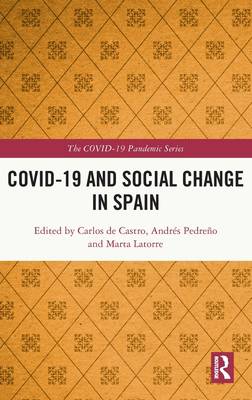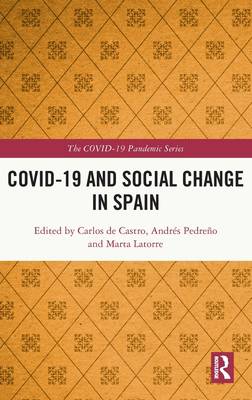
- Retrait gratuit dans votre magasin Club
- 7.000.000 titres dans notre catalogue
- Payer en toute sécurité
- Toujours un magasin près de chez vous
- Retrait gratuit dans votre magasin Club
- 7.000.0000 titres dans notre catalogue
- Payer en toute sécurité
- Toujours un magasin près de chez vous
COVID-19 and Social Change in Spain
Description
Originating in the popular Sociología en Cuarantena blog, this volume provides a detailed and multifaceted analysis of the social impact of the COVID-19 pandemic in Spain.
This book originates in the great upheaval caused by the COVID-19 pandemic when the unprecedented announcement of global lockdowns paralysed the world and put social relations on hold. In response, a loose collective of sociologists, historians and philosophers from various Spanish universities began to share their reflections on the pandemic on the Sociología en Cuarantena blog. This book takes some of those thoughts and delves deeper into the recurring themes as they relate to the Spanish experience of the pandemic. The chapters in the first part of the book address the social and political context of the various measures put in place by the government to deal with the health, economic and social effects of the pandemic. Subsequently, several chapters examine how the pandemic led to important reflections on uncertainty and authority in processes of scientific knowledge production. Other chapters analyse the effects of the pandemic on demographics, the organisation of care, the education system, the organisation of work and the recognition of essential workers, immigration policies and the digitalisation of society. Collectively, the contributions call into question the narrative of exceptionalism that views the pandemic as a singular event that is uniquely responsible for the present situation of uncertainty and instability. They also draw attention to the fragility of social prestige and trust in neglected and weakened public institutions, as well as identifying a growing socio-political polarisation that may be highly significant in the future.
This collection will appeal to students and researchers with an interest in contemporary Spain and the socio-political effects of the COVID-19 pandemic.
Spécifications
Parties prenantes
- Editeur:
Contenu
- Nombre de pages :
- 190
- Langue:
- Anglais
- Collection :
Caractéristiques
- EAN:
- 9781032251295
- Date de parution :
- 18-11-22
- Format:
- Livre relié
- Format numérique:
- Genaaid
- Dimensions :
- 156 mm x 234 mm
- Poids :
- 471 g






